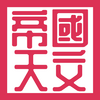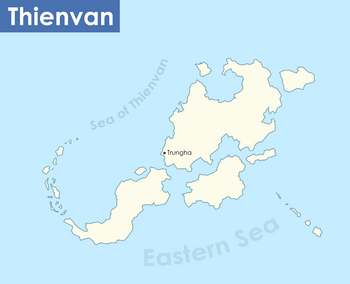Thienvan: Difference between revisions
Jump to navigation
Jump to search
No edit summary |
No edit summary |
||
| (3 intermediate revisions by the same user not shown) | |||
| Line 8: | Line 8: | ||
|image_flag2 = <!--e.g. Second-flag of country.svg--> | |image_flag2 = <!--e.g. Second-flag of country.svg--> | ||
|alt_flag2 = <!--alt text for second flag--> | |alt_flag2 = <!--alt text for second flag--> | ||
|image_coat = | |image_coat = File:Thienvan Alternate State seal.png | ||
|alt_coat = <!--alt text for coat of arms--> | |alt_coat = <!--alt text for coat of arms--> | ||
|symbol_type = | |symbol_type = State Seal | ||
|national_motto = 𡘯花評 <br> ''lớn Hoa Bình'' <br> Everlasting Peace | |national_motto = 𡘯花評 <br> ''lớn Hoa Bình'' <br> Everlasting Peace | ||
|national_anthem = 排欱滝鐄 <br> ''Bài hát sông vàng'' <br> Song of the Golden River | |national_anthem = 排欱滝鐄 <br> ''Bài hát sông vàng'' <br> Song of the Golden River | ||
| Line 16: | Line 16: | ||
|other_symbol_type = Royal Seal | |other_symbol_type = Royal Seal | ||
|other_symbol = [[File:RoyalsealThienvan.png|100px]] | |other_symbol = [[File:RoyalsealThienvan.png|100px]] | ||
|image_map = Thienvan_map.png | |image_map = Thienvan_map.png|180px | ||
|alt_map = <!--alt text for map--> | |alt_map = <!--alt text for map--> | ||
|map_caption = Location of Thienvan | |map_caption = Location of Thienvan | ||
| Line 120: | Line 120: | ||
|footnotes = <!--For any generic non-numbered footnotes--> | |footnotes = <!--For any generic non-numbered footnotes--> | ||
}} | }} | ||
'''Thienvan''' ({{wpl|Vietnamese language|Thienvanese:}} 天文, Thiên Văn) or occasionally {{wpl|romanization|romanized}} as Tian Van, and officially known as the '''Thienvanese Empire''' ({{wpl|Vietnamese language|Thienvanese:}} 帝國天文, Đế quốc Thiên Văn), is a {{wpl|unitary state|unitary}} {{Wpl|constitutional monarchy}} located in XXX. Thienvan is constituted of an area of XXX km2 which borders XX to the north, XXX to the south, and XX to the east. The country is consistent of 14 provinces, and 2 special metropolitan districts and is home to 82.4 million people. The largest city in Thienvan is Trungha (7.6 million) and is also the nation's capital as well as a significant {{wpl|global city}}. | |||
==Etymology== | ==Etymology== | ||
==History== | ==History== | ||
===Prehistory=== | ===Prehistory=== | ||
===Classical Era=== | |||
==Geography== | ==Geography== | ||
===Climate=== | ===Climate=== | ||
Latest revision as of 17:39, 14 May 2020
This article is incomplete because it is pending further input from participants, or it is a work-in-progress by one author. Please comment on this article's talk page to share your input, comments and questions. Note: To contribute to this article, you may need to seek help from the author(s) of this page. |
Thienvanese Empire 帝國天文 Đế quốc Thiên Văn | |
|---|---|
| Motto: 𡘯花評 lớn Hoa Bình Everlasting Peace | |
| Anthem: 排欱滝鐄 Bài hát sông vàng Song of the Golden River | |
Royal Seal | |
 Location of Thienvan | |
| Capital and largest city | Trungha |
| Official languages | Thienvanese |
| Recognised regional languages | Payan, Serang |
| Ethnic groups (2014) | Van (87.4%) Payan (5.7%) Serang 4.5% Other 2.3% |
| Religion | Thandao |
| Demonym(s) | Thienvanese |
| Government | Unitary constitutional monarchy |
• Empress | Phạm Tu Minh |
| Lê Công Lập | |
| Legislature | Nhatban |
| Council of Scholars | |
| Commons Council | |
| Population | |
• 2018 estimate | 82,954,423 |
• 2014 census | 82,432,538 million |
| GDP (PPP) | estimate |
• Per capita | $32,452 |
| GDP (nominal) | estimate |
• Per capita | $30,191 |
| Gini | 31.4 medium |
| HDI | 0.892 very high |
| Currency | Dong (TVD) |
| Date format | yyy-mm-dd |
| Driving side | right |
| Calling code | +475 |
| ISO 3166 code | XI |
| Internet TLD | .TV |
Thienvan (Thienvanese: 天文, Thiên Văn) or occasionally romanized as Tian Van, and officially known as the Thienvanese Empire (Thienvanese: 帝國天文, Đế quốc Thiên Văn), is a unitary constitutional monarchy located in XXX. Thienvan is constituted of an area of XXX km2 which borders XX to the north, XXX to the south, and XX to the east. The country is consistent of 14 provinces, and 2 special metropolitan districts and is home to 82.4 million people. The largest city in Thienvan is Trungha (7.6 million) and is also the nation's capital as well as a significant global city.

